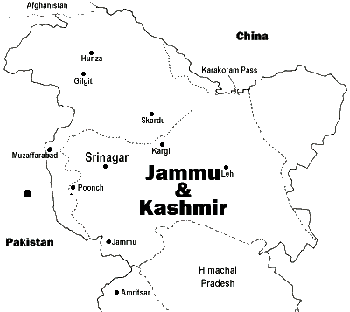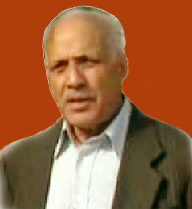The mess about J&K elections
|
|
|
*-K. N. Pandita
|
|
While elections for the state assemblies in five states will be held according to the schedule of the Election Commission of India, J&K has been left out of the process. Normally elections in this state should have been announced around 10th of September and the polling would have taken place sometime in November 2008.
By not announcing whether elections in J&K will or will not be held on time, the Election Commission has created a situation of suspense and uncertainty. Deferring elections for a specific period of time for the state assemblies or for parliament is nothing new or extraordinary. Deferment of elections owing to some specific reasons and for specific time is generally happens on the advice of the government. Nevertheless, the Election Commission has the discretion allowed to it by the Constitution to decide about the dates. There has been something mysterious and inexplicable about the J&K elections this time. Two mainstream political parties, namely National Conference and Peoples Democratic Party had an objection to holding elections according to schedule in November 2008. They argued that the ground situation in the state was not conducive for holding election. The Congress measured its steps with more caution. In the beginning it came somewhat closer to other two regional parties and did not think it feasible to be categorical on the subject. Later on, with some unknown factors interacting, PCC came out in favour of holding elections on time. This re-activated its cadres but only to find cold water poured over their expectations. This speaks of deep division within the party decision making apparatus. As days rolled by, Congress began to drag its feet. In a hyperbole, its spokesman said that the decision of holding or not holding elections on time was in the hands of the Election Commission. Though the buck was passed easily, but everybody understood that the Congress-led government wanted to hunt with the hound and run with the hare. The Election Commission visited Srinagar to assess the ground situation. It met with political leaders of different hues including the Hurriyat separatists and their other groups. It passed no verdict on ground situation, but was engaged in a crucial debate on what the ground situation was and what should be the proper approach meaning whether to defer elections of hold them on time. At the end of the day, differences within the Commissioners came to surface. Such is the complicacy of Kashmir situation and such is the mess of Kashmir elections. At last, after a long spell of silence and inaction, the EC came out with the statement that it did not consider ground situation conducive for elections in Kashmir. However, strangely it did not specify the “ground situation” though we do understand what they mean and why. Why do NC and PDP ask for deferring elections? Why does Congress play seek and hide? Why is EC tormented and riding the horns of dilemma? And why is BJP insisting on holding the elections on time? These are very interesting questions. First let us try to analyse what is meant by “ground situation not conducive”. Ground situation has seldom been conducive in Kashmir region. But the leading political parties would manage it and giving a false impression of normalcy to the rulers in New Delhi, find themselves catapulted into the seats of power through the charade of elections.  If the ground situation was conducive during the long spell of National Conference rule, then late Afzal Baig, the Deputy Chief Minister of Sheikh Abdullah and the then president of Plebiscite Front had no need to publicly display a green handkerchief and rock salt cube to the audiences in his election rallies. Kashmiris know these two things symbolize Pakistan. The formation of Muslim United Front (MUF), which took part in the elections of 1986 but was cheated and bruised, explicitly showed that the ground situation in Kashmir was far from normal. In 1990, entire Kashmiri Pandit community was forced out of its habitats in the valley. They live in Jammu camps and elsewhere in the country ever since. Did it show that ground situation in the valley was normal? Not at all, yet elections were held in 1996 and 2002. Therefore, it is presumed that all elections in Kashmir have been held in a state of abnormal conditions. As such the plea of National Conference and the PDP that conditions are not conducive is a vague and politically motivated statement. If the Election commission defers elections in J&K on that plea then one may feel unhappy with it for its failure to be of independent views. The separatists never accepted elections in the state as legal and popular. Their stand is clear and unambiguous. They are in favour of sharia-based Islamic political system, which does not recognize either secular or democratic dispensation stipulated by the Constitution of India. We should have no complaint against them. The fact of the matter is that two-month long Jammu agitation on land row has changed the complexion and contours of J&K politics. It has a bearing on center’s J&K policy as we4ll. In the first place, Jammu agitation exposed all political parties feigning secularism in the state. It unmasked those political groups and personalities who had been wearing a mask and misleading the people during last six decades. It struck at the credibility of valley-based political groups that have been managing to grab votes by fair and unfair means and assume the reins of power. In a sense Jammu agitation led to the deepening of polarization, a prospect that was there ever since accession but had been put under wraps by demagogues.
Now the people in Kashmir valley feel driven to the wall. They have come to realize that all evils lie in voting mainstream political groups to power. The mass march to Muzaffarabad, though aborted, did convey a message to the common voter in Kashmir that his no-exercising of vote would change the course of events. That is precisely what keeps the mainstream parties like NC, PDP and Congress alienated from the people. Therefore these parties want to gain time so that they can convince their constituencies about the legitimacy of their political stance. How they will do it and to what result is something which only time will decide. The gap may or may not be filled. The dilemma is about Kashmir valley voters only; it is not true about the voters in Jammu and Ladakh regions. However, the people of these two regions are made a hostage to the whims and whimpers of the valley leadership, which has takers in the UPA run government. But BJP stand aloof in this melee. BJP’s stand is much more clear and unambiguous. Its argument that deferring of elections means giving a wrong signal to the ultras and separatists is quite weighty. Giving time to traditional, but much discredited, political groups to regain lost ground means indirectly supporting a stupendous campaign of further misleading the people of the state. If national interests are to be served, then people should be spared the harangues of entrenched ambivalent political parties.
The fears of the UPA government and the Congress are that the true ground situation in Kashmir Valley will get exposed once people refuse to come out of their homes to cast the ballot paper. In other words, Kashmir Valley is now in the process of a Satyagraha or civil disobedience. This is of immense disadvantage to the Indian State. Conducting fair and scheduled elections and returning a representative government is the only cogent argument to legitimize India’s presence in Kashmir. If this is scrapped, India’s position in Kashmir is exceedingly vulnerable. (The writer is the former Director of Central Asian Studies, Kashmir University) |
 *K.N. Pandita: Born in Baramulla, Kashmir in 1929 did graduation from St. Joseph’s College in Arts with English literature. The tribal raid of October 1947 destroyed his family like hundreds of other Kashmiri Hindu families in Baramulla. *K.N. Pandita: Born in Baramulla, Kashmir in 1929 did graduation from St. Joseph’s College in Arts with English literature. The tribal raid of October 1947 destroyed his family like hundreds of other Kashmiri Hindu families in Baramulla.After doing M.A. from Punjab University, he served as Lecturer in State Degree Colleges and in 1958 earned a scholarship from the Indian Ministry of Education for higher studies at the University of Teheran, Iran. Four years of study and research at the University of Teheran earned him a Ph.D. in Iranian Studies. He joined Kashmir University in 1963 and it’s Centre of Central Asian Studies in 1976. He rose to become Professor and Director of this Centre till his superannuation in 1987. He is not only the first Kashmiri to obtain Ph.D. from Teheran University but is also the first to have worked in close collaboration with a number of Central Asian Academies of Science particularly the Tajik Academy. His travelogue titled My Tajik Friends won him Sovietland Nehru Award 1987. |
| Copyrights © 2007 Shehjar online and KashmirGroup.com. Any content, including but not limited to text, software, music, sound, photographs, video, graphics or other material contained may not be modified, copied, reproduced, republished, uploaded, posted, or distributed in any form or context without written permission. Terms & Conditions. The views expressed are solely the author's and not necessarily the views of Shehjar or its owners. Content and posts from such authors are provided "AS IS", with no warranties, and confer no rights. The material and information provided iare for general information only and should not, in any respect, be relied on as professional advice. Neither Shehjar.kashmirgroup.com nor kashmirgroup.com represent or endorse the accuracy or reliability of any advice, opinion, statement, or other information displayed, uploaded, or distributed through the Service by any user, information provider or any other person or entity. You acknowledge that any reliance upon any such opinion, advice, statement, memorandum, or information shall be at your sole risk. |
